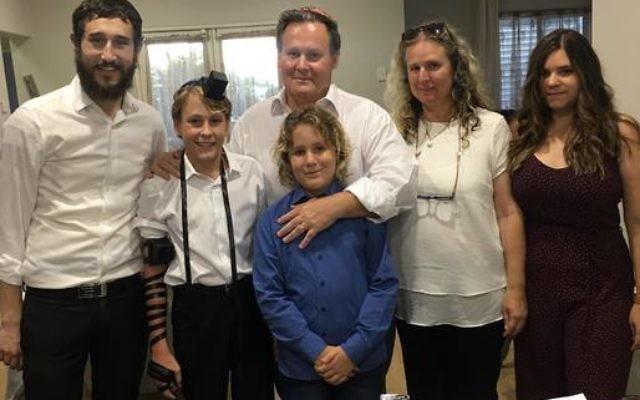First bar mitzvah in Townsville

LAST month, Barnabas Sarnyai achieved more than a milestone.
Not only did the 13-year-old perform his bar mitzvah – he was the first to do so, ever, in the northern Queensland city of Townsville.
But records aside, Barnabas told The AJN that the occasion simply represented his joining of the Jewish community.
“It gave me a much better understanding of the core values of Judaism, and the tools I need to improve upon myself and the world around me,” he said.
Over two months, Barnabas studied under the tutelage and mentorship of Rabbi Ari Rubin of Chabad of RARA North Queensland.
While Rabbi Rubin is based in Cairns, the duo were undeterred by the 350 kilometre distance that separated them. Twice a week, the rabbi and his young student completed their studies – entirely through Skype.
“We would spend a lot of time speaking about the basics of Judaism, what it means to be a Jew – especially in today’s modern age – and we tied that into becoming a man,” Rabbi Rubin reflected.
Setting another precedent, the bar mitzvah was the first time Rabbi Rubin conducted all teachings through the use of online technology.
And so, on a Chanukah Shabbat, the countless video chats culminated in Barnabas’ transition into Jewish adulthood, as the rabbi, Sarnyai family, and 20 members of the close-knit Townsville Jewish community gathered in a private home-cum-Chabad of Townsville headquarters.
Rabbi Rubin mused upon Barnabas’ “very keen” and “attentive” approach, adding that the experience was made even more special by the fact that his father Zoltan joined in each of the lessons.
Speaking with The AJN, Zoltan Sarnyai kvelled with pride: It had been an arduous journey to Barnabas’ bar mitzvah for the Sarnyai family, spanning long before Skype – to Europe.
The professor of pharmacology at James Cook University spoke of his own upbringing in postwar Hungary.
“It was very difficult,” noted Zoltan, who was raised by his aunties, survivors of the camps.
“Nothing was really spoken about, and I was not raised as very Jewish. It was not something that you wanted to emphasise in a communist country after the war.”
It wasn’t until Zoltan visited a Jewish cemetery in his late teens that he began to ask questions of his family’s past, embarking upon a quest to discover his roots.
In many ways, Barnabas’ rite of passage represented the rekindling of a family’s link to its history; a repossession of cultural identity displaced in the abyss of the post-Holocaust reality within communist society.
“We may not be religious in a strict sense, but traditions and belonging are very important. We believe it is crucial as a family to have a cultural identity beyond being Hungarian at home – and that is being part of the wider Jewish community,” explained Zoltan.
The connection to family history was honoured deeply by Barnabas in his bar mitzvah speech.
He told the story of his paternal great-grandfather, who was drafted into the Hungarian army to fight on the side of the Germans.
While driving a horse-drawn carriage on route to the front, he made the courageous decision to defect.
“He slowed the horses down, waited until nobody was watching, jumped off the carriage, climbed up a tree and waited and waited there for a day or so. He then walked many kilometres,” Barnabas shared.
It would take his great-grandfather more than four weeks to return to his village, hiding in fields by day, and traversing only under the shroud of darkness by night.
Barnabas also recounted the story of his maternal grandfather.
While coming from an agricultural family, at the age 14 years old, Barnabas’ grandfather decided that this would not be his fate. Putting down his hoe, the following day he travelled to the nearest Hungarian city, enrolled himself in college, and soon discovered a strong talent for mathematics. He was selected for a special program in the Soviet Union.
Despite not knowing a word of Russian, Barnabas’ grandfather would teach himself, graduating as a railway engineer, and would eventually become a chief executive of the Hungarian Cable Company.
“[My bar mitzvah] made me feel a connection to the history of my family and the hardships they faced that influenced me today,” Barnabas reflected.
“This return to the family – to love and to look after them, as well as to go away to discover, to prosper and to give back – this is the legacy of my family which I will bring with me on my journey to my adult life.”
Zoltan added: “I felt very emotional for this whole experience – not just for my son, but for my aunties. I wish they knew and could have seen this moment.
“We are now connected to the past, and to our future.”
REBECCA DAVIS

comments